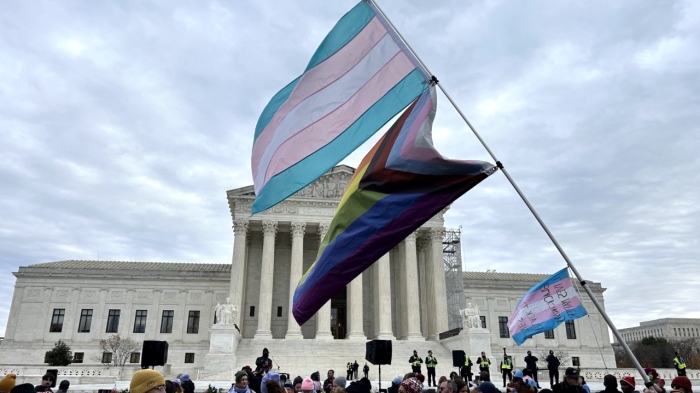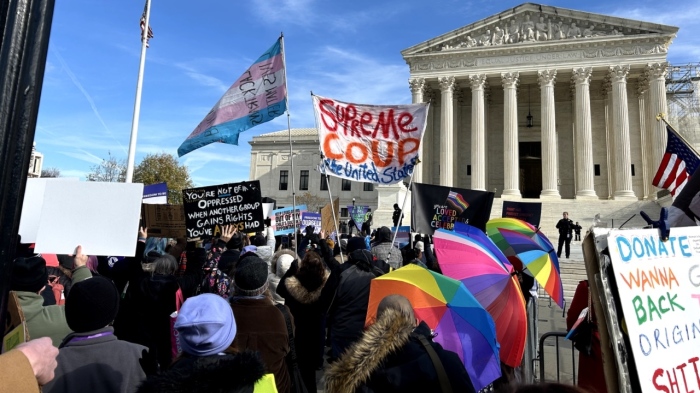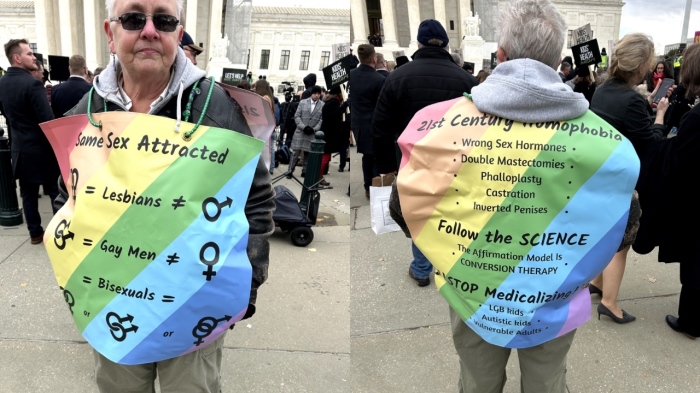
WASHINGTON — Dueling rallies competed outside the U.S. Supreme Court on Wednesday as justices heard arguments in a potentially landmark case concerning trans procedures for minors.
Hundreds of people endured a bitterly cold day in the nation’s capital to express their opinions regarding United States v. Skrmetti, which will decide whether Tennessee can ban puberty blockers and body-mutilating surgeries from being performed on youth who exhibit gender dysphoria.
During the arguments, Justice Samuel Alito and other conservative justices cited studies that have emerged in countries including the United Kingdom and Sweden, where such procedures have been curtailed amid concerns about their long-term harm.
A large gathering of people sporting trans flags and other LGBT paraphernalia demonstrated outside the court, though some who identified as liberals spoke to The Christian Post and presented their opposition to the case as an issue of human rights.

‘A real mental health crisis’
Laura Haynes, who traveled to Washington, D.C., from California and has served as a Court Appointed Special Advocate (CASA) in the foster care system in the state, described herself to CP as a liberal Democrat and an atheist who sees the case as a human rights issue.
Haynes said she traveled from across the country to demonstrate at the Supreme Court in part because she filed an amicus brief in the case.
Citing her experience in the foster care system, Haynes said she believes gender dysphoria emerges from other mental health issues.
“There’s a real mental health crisis going on in our country,” she said, adding that she believes many parents have been able to use the trans label to explain away some of the proliferating mental health issues among children.
“There’s a lot of denial with child mental illness that is underlying and [pushing] parents to accept these identities in their kids,” she said. She added she is “very concerned” that would-be foster parents and CASAs will face discrimination based on their unwillingness to affirm trans identity in children.
Haynes also pushed back against those who would frame opposition to trans ideology in solely religious terms.
“It has nothing to do with religion,” she said. “To me, it’s a human rights thing. You can’t alter children out of their natural development.”
Haynes shared that she suffered from an endocrine disruption as a child because her mother took diethylstilbestrol (DES), which was given to mothers in the U.S. between 1938 to 1971 for pregnancy complications, but was later found to damage the children conceived on it.
Haynes believes that the puberty-blocking hormones for children at issue in the case before the high court are comparable to the drug that damaged her.
“I always grew up with this knowledge that you don’t endocrine-disrupt people, it’s very damaging,” she said. “And that might have been what made me so furious about it.”
Haynes also said she fears that laws like those in California, where potential foster parents are screened for their views on LGBT issues, could endanger the work that she and others like her do. Her deepest concern is any law that could break up a family.
“You’re looking out for the best interest of the child,” she said, describing her goals as a foster care worker, adding that she always sought for them “a wide-open future and to keep them well-connected to loving others — whether that’s their family, whether that’s the foster family.”
‘Homophobia of the 21st century’
Sherrie Taha, a Democrat who served as the Soil-Water Conservation Commissioner for Polk County, Iowa, and ran for the Iowa House of Representatives in 2016, told CP that she traveled to Washington, D.C., from her midwestern state to protest what she described as “the homophobia of the 21st century.”
Taha adorned herself with a double-sided display protesting the idea that same-sex attracted people are inherently trans. Her sign also denounced “21st century homophobia” with a list of procedures that included wrong sex hormones, double mastectomies, phalloplasty, castration and inverted penises.

“People are under the misconception that this is a right-wing conservative issue, and that it’s anti-trans,” she said. “I’ve been an out lesbian since [activist] Anita Bryant was romping around the country, and I think liberal Democrats are hopefully coming to realize that … this is a human rights issue in a much bigger way.”
“Children have the right to grow up fully intact,” she said. “It’s the homophobia of the 21st century. It’s tragic. I’m here because it’s just tragic.”
Multiple individuals associated with the nearby pro-trans rally, where actress Elliot (Ellen) Page and trans-identifying ACLU lawyer Chase Strangio delivered speeches, declined interviews with CP.
Jon Brown is a reporter for The Christian Post. Send news tips to jon.brown@christianpost.com








